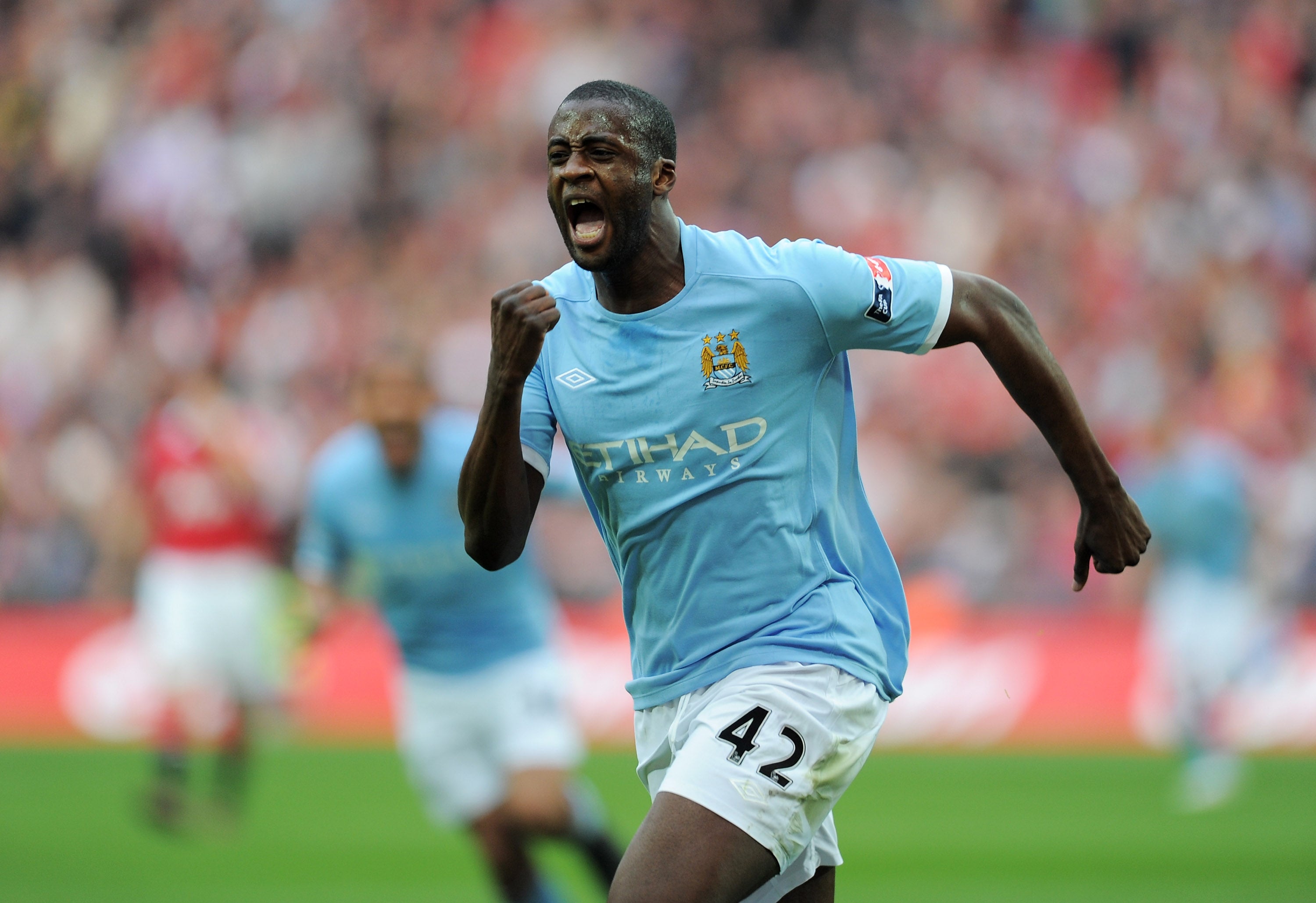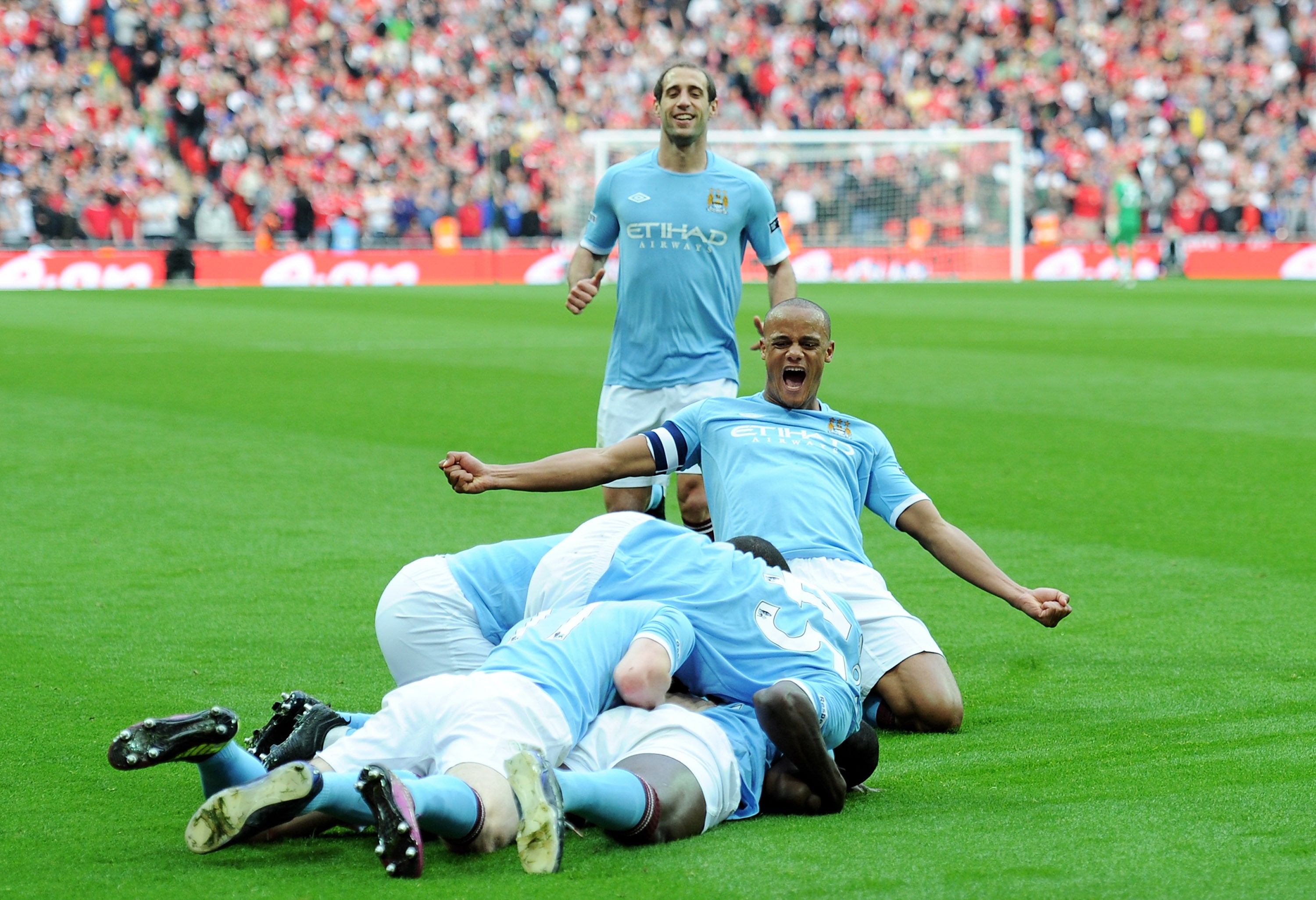How Yaya Toure changed everything for Man City – and delivered Man Utd a ‘slap in the face’
The Ivorian inspired victory over Manchester United in the 2011 FA Cup semi-final, before securing a first trophy in 35 years against Stoke in the final

Your support helps us to tell the story
From reproductive rights to climate change to Big Tech, The Independent is on the ground when the story is developing. Whether it's investigating the financials of Elon Musk's pro-Trump PAC or producing our latest documentary, 'The A Word', which shines a light on the American women fighting for reproductive rights, we know how important it is to parse out the facts from the messaging.
At such a critical moment in US history, we need reporters on the ground. Your donation allows us to keep sending journalists to speak to both sides of the story.
The Independent is trusted by Americans across the entire political spectrum. And unlike many other quality news outlets, we choose not to lock Americans out of our reporting and analysis with paywalls. We believe quality journalism should be available to everyone, paid for by those who can afford it.
Your support makes all the difference.There used to be a banner that hung from the top tier of the Stretford End. It was an exercise in mocking Manchester United’s neighbours, containing a number that rose by the year. The ticker had reached 35 before it was taken down. Yaya Toure was the man who removed it; not physically but because of what was, until Saturday, the biggest Manchester derby ever held in the FA Cup.
The 2011 FA Cup was Manchester City’s first trophy in 35 years. It was secured by Toure’s winner in the final against Stoke; even that felt less important, however, than his semi-final decider against United.
The balance of power in Manchester was shifted by Sheikh Mansour’s millions, by the management of Roberto Mancini, Manuel Pellegrini and, most emphatically, Pep Guardiola, by some of United’s missteps, and by a host of City players.
Vincent Kompany is their most successful captain, Sergio Aguero their record scorer, though Erling Haaland is eating up other goalscoring feats, there was a case for calling David Silva their greatest player and there are growing reasons to instead give that mantle to Kevin de Bruyne. But Toure’s catalytic impact meant he has always had an argument to be the most significant.
“From the moment I signed for the club I always had the feeling it was going to be a huge project,” he said. “My head was about trying to change things and make things happen.”
More than most, he made things happen. United had won six of eight derbies since City’s 2008 takeover; they had also overturned their one defeat in the second leg of the League Cup semi-finals. Then they arrived at Wembley in April 2011.
“Winning that first trophy was important. Of course, in that period United were so comfortable - they’d win week in, week out, they were winning the league easily,” Toure recalled. “At the beginning it was very tough. It’s only now, as I look back, that I realise how tough.”
Bought from Barcelona, Toure was one of the trophy winners City had hired to try and change their attitude. Another made his own contribution in the dressing room. There was a rousing team talk from City’s most experienced and decorated player, the World Cup winner Patrick Vieira. “He delivered a great speech,” Toure recalled. “We all remember the message.” And yet, as Toure noted, United still began in imposing mood. Like City now, they were going for a treble. “In the first half we were getting battered,” he said. “They were dominant in all aspects: defensively, offensively, all over the field. Whereas the second half we knew we had to change the mentality and go for it. Because after that it’s going to be so noisy, the city.”
To borrow Ferguson’s phrase, Toure turned City into the noisy neighbours. His goal, he argued, was “not something creative, just desire”. He felt Michael Carrick was the United Sergio Busquets, the holding midfielder comfortable in possession. But he closed him down and robbed him. “Then I only had to push the ball past [Nemanja] Vidic because I believed in my strengths and was arriving at pace. [Edwin] Van der Sar came out – he’s big – but I just knew I had to put the ball between his legs. I didn’t think a lot,” Toure said, making it all sound easy.
He had often been a defensive midfielder for Guardiola’s Barcelona. He played as a centre-back in the 2009 Champions League final. But he was unleashed in Manchester as an attacking midfielder, one who scored 24 goals in the 2013-14 season. “In England, I had the freedom to run,” Toure said. “I think most of my game was about taking advantage of those sort of moments at speed and I think that few seconds against United was like a resume of my career at Man City.”

That City career was not without its controversies. Nor was that of another whose arrival came at a cost to United; a more direct one, arguably. Carlos Tevez swapped red for blue in 2009, City infamously announcing his arrival with a billboard that read, “Welcome to Manchester”. The Argentinian went on to lift the 2011 FA Cup as City captain.
“Tevez was one of the biggest players and to take him from a big rival and bring him to you, you can maybe understand why Ferguson was frustrated and pissed off,” Toure said. “Tevez was incredible in that period. I was at Barcelona then but I remember being away at the time and seeing it on Sky and it was a big thing. ‘Tevez switches from United to City’. It was incredible. Tevez had been someone who was so important in the reign of United. [Dimitar] Berbatov, [Wayne] Rooney, [Ryan] Giggs: this team was unbeatable. So to see one of their talismans go to their rival like that is something; you could see something was changing.”
Yet he accelerated the change. City have won the Premier League six times since United last did; Guardiola’s side could emulate Ferguson’s team of 1999 by doing the treble. City have now won more since Toure’s 2017 departure than they did with him, but, like Eric Cantona for United, he will always have a status as the man who ended a wait that spanned decades. Now he is coaching Tottenham’s Under-16s. “I dream to one day be a manager,” he said. “We never know in life; maybe I’ll meet Man City one day again.”

Or maybe he will face United again. Which may cause them tremors. The FA Cup semi-final was not even their most famous derby defeat in 2011; five months later, with Toure at the heart of the midfield, City scored six at Old Trafford. “I think what hurt United the most – the club, their fans – was the 6-1 win.” Toure added. “That was impressive from us. After the FA Cup, we believed we could beat them even at Old Trafford with Ferguson. Ferguson is one of the great managers. Old Trafford is the most emblematic stadium around the world. Most of their players were there. It was like a slap in the face of United fans.” Toure still has a memento, a souvenir from United in his house. “It’s in Ivory Coast,” he said. “That teamsheet is in a United frame.”



Join our commenting forum
Join thought-provoking conversations, follow other Independent readers and see their replies
Comments